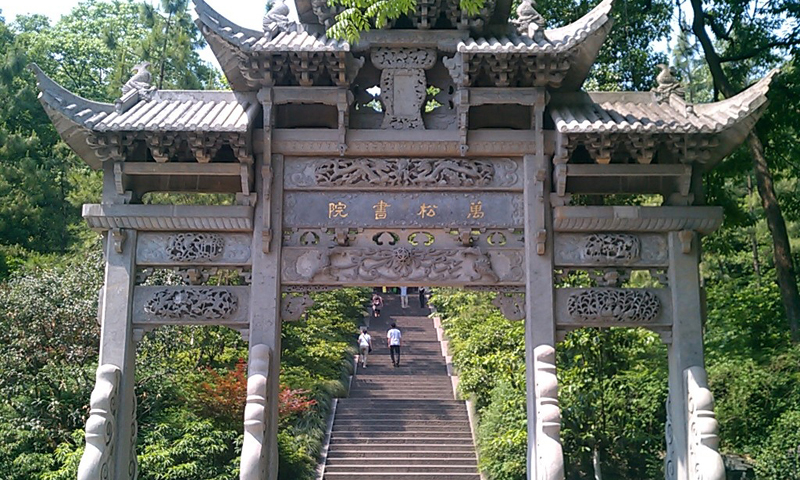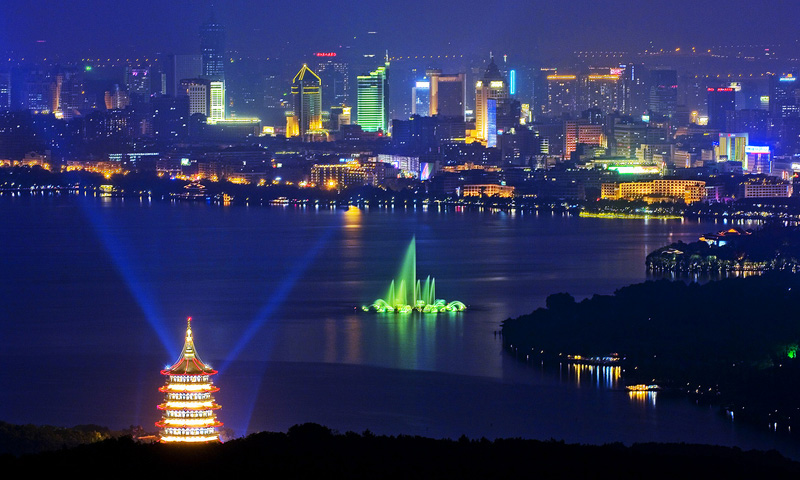The Story of West Lake: Mountains Beside the LakeOnce upon a time, a dragon and a phoenix lived beside a river in heaven. They did everything they could to burnish a rock into a glimmering pearl. Upon spying the beautiful pearl, the goddess Wangmu was tempted by its beauty and sent someone to steal it.
Realizing that it was gone, the dragon and phoenix went in search of their lost pearl and eventually traced it straight to the goddess. They demanded Wangmu return the pearl to them, but she refused and a fight broke out in the heavens.
In the midst of their struggle, the pearl fell from heaven to earth and transformed into the beautiful West Lake. The dragon and phoenix became the Yulong and Fenghuang mountains, where they still stand guard over their pearl today.
The Butterfly Lovers (梁山伯与祝英台) In the Eastern Jin Dynasty (317- 420 AD), there lived a beautiful and intelligent maiden named Zhu Yingtai, the only daughter of a wealthy, noble family living in Shangyu, Zhejiang. Traditionally, females were forbidden to attend school, but Yingtai, driven by her thirst for knowledge, convinced her father to allow her to disguise herself as a male so that she could receive an education at Wansong Academy in Hangzhou.
On her journey to the city, Yingtai met Liang Shanbo, a poor scholar from Kuaiji and together, they shared a bond of brotherhood, having found they had interests in common. For the next few years in school, they shared a room and studied together. Yingtai gradually fell in love with Shanbo while the latter had no idea that his best friend was a girl. One day, Yingtai received a letter from her father, telling her to come home.
Before she returned home, she told Shanbo that she would like to encourage a romantic match between Shanbo and her ‘sister’, and bid him to visit her home as soon as he could. Not long after, when Shanbo finally visited Yingtai and discovered her true identity it was too late as her father had already arranged an engagement between Yingtai and Ma Wencai, a young man who came from a rich family.
The broken-hearted Shanbo, who had by this time, fallen in love with Yingtai, fell critically ill and soon passed away. On the day of the wedding, the marriage procession was stopped midway by strong whirlwinds. Upon hearing that Shanbo’s grave was nearby, Yingtai requested the procession to stop so that she could pay her respects and while there at his grave she broke down and wept in despair.
Suddenly, without warning, there was a clap of thunder, the grave cracked opened and Yingtai leapt in without hesitation. The spirits of Liang Shanbo and Zhu Yingtai ultimately emerged and flew away as a pair of beautiful butterflies, forever tied in their love for each other. This story is one of the most popular folk tales in China and is regarded as the Chinese equivalent of Romeo and Juliet. The Eastern Jin dynasty (set up by Han Chinese) is not to be confused with the Jin dynasty set up by the Jurchen tribes from northeast China or Manchuria.
Wansong Academy (万松书院) Established in 1498, Wansong Academy was the largest and most prestigious college in Hangzhou during the Ming and Qing dynasties. The present-day Wansong Academy was rebuilt in 2002.
Address: No.81, Wansongling Road
Opening Hours: 7.30 am-5 pm
Admission Fee: 10 yuan
Tel: 86-571-86079490
Legend of the White Snake (白蛇传) Set in the Song Dynasty (960-1279AD), there was once a young boy named Xu Xian who saved a white snake who was actually a spirit named Bai Suzhen. Years later, the boy became a scholar and met a beautiful lady with an umbrella at the "Broken Bridge" by the West Lake.
As it was raining and he did not have an umbrella, the lady offered him hers and left. Unknown to Xu Xian, this lady was the White Snake Spirit he had saved and she had returned to repay his kindness by helping him whenever he needed a hand. They fell in love and their marriage produced a son. However, their union was against heavenly laws as mortal and demons belonged to different realms, so when they were discovered by Fa Hai, a monk who had magical powers, Fa Hai forced Bai to reveal her true form in the hope that Xu would leave her. As the couple genuinely loved each other this attempt failed, so Fa Hai imprisoned Bai in the Leifeng Pagoda for all eternity.
In some versions of this legend, Xu raised their son to become an imperial top scholar who returned to pay respect to his mother, and as a result of her son’s filial piety, the heavens were touched and Bai was released. She attained immortality and rose to the celestial realm, forever unable to reunite with her family because of the heavenly laws. Although this version is not as tragic as her eternal imprisonment in the pagoda, it is still considered a tragic ending as the lovers are still separated for all eternity.
Today, Bai is regarded by the people as a kind and loving fairy despite superstitiously being considered a spirit, which, in folklore, is equivalent to a demon. To many, the Broken Bridge at Baidi (Bai Causeway) epitomizes the lingering remnants of the couple's eternal love and evanescent dreams.
Lingering Snow on the Broken Bridge (断桥残雪)Broken Bridge in reality is not broken. Located at the west end of Baidi (Bai Causeway), the sun in winter melts the snow on the raised portion of Baidi more quickly than the lower portions. Hence, when viewed from the top of Precious Stone Hill (Baoshishan 宝石山), it gives the illusion of a broken bridge. According to legend, this was where the couple Xu Xian and Bai Suzhen first met and fell in love. Just like their love, the lingering snow on Broken Bridge symbolizes their fleeting moments together before being separated for all eternity.
Leifeng Pagoda (雷锋塔) Originally built in AD 977, during the reign of King Qian Chu of the kingdom of Wu and Yue, it was named Huang Fei Pagoda after the old king's favorite concubine who gave him a son.
The entire pagoda was constructed with bricks, but only on the foundation bricks were inscribed with Buddhist sutras. These provided a means to protect from evil, the Buddhist relics buried under the structure.
As the Chinese word for Buddhist sutras is 'jin', which sounds almost the same as 'gold' in Chinese, later generations misunderstood the significance of the pagoda, believing that it would bring them riches. As a result, the pagoda suffered severe damage throughout the ages, its wooden façade burnt by marauding Japanese pirates.
In addition, people would also steal the foundation bricks of the pagoda for two reasons. Firstly, many believed that the 'golden bricks' would bring them wealth, while secondly, the pagoda was said to have the power to repel snakes, having been renamed Leifeng Pagoda according to the Legend of the White Snake. In Hangzhou, many enterprising locals reared silkworms as a livelihood, and they would steal the foundation bricks, believing that these would protect their silkworms from snakes.
In the face of all this mistreatment, the structure gradually weakened before collapsing in 1924. Today, the ancient original monument stands as if bloodied, but not beaten, its skeletal brick remains making it an intriguing and rather sympathetic sight upon the picturesque landscape of beautiful West Lake. The new Leifeng Pagoda was later built at the original site in October 2002.
Visitors entering can still view the remnants of the old pagoda and tour the new one that stands guard over it. Inside, there is a souvenir shop and fine ornamental wooden cravings of the legend of Madam White Snake on exhibit. On the top floor, visitors can enjoy a panoramic view of the entire West Lake. Inside are murals depicting the life of Buddha and a splendid gold-plated ceiling made up of 2,002 small silver pagodas of King Asoka. Set in the middle of the roof, a lotus flower which can descend to ground level contains a model of the modern Leifeng Pagoda.
The Silver Pagoda of King AsokaDuring excavations of the site, priceless Buddhist relics were found buried under the old pagoda. These were housed inside a silver pagoda of King Asoka. Made of pure silver, the little pagoda is intricately designed and contains a gold box, allegedly where remains of Buddha's hair are kept.
Address: No.15, Nanshan Road
Opening hours: 8 am-5:30 pm
Admission fee: 40 yuan
Tel: 86-571-87982111



